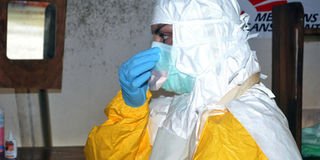Nigeria on red alert after first Ebola death

PHOTO | CELLOU BINANI A member of Doctors Without Borders (MSF) puts on protective gear at the isolation ward of the Donka Hospital, on July 23, 2014 in Conakry. Nigeria was on alert against the possible spread of Ebola on July 26, 2014, a day after the first confirmed death from the virus in Lagos, Africa’s biggest city and the country’s financial capital.
What you need to know:
- The health ministry said Friday that a 40-year-old Liberian man died at a private hospital in Lagos from the disease, which has now killed more than 650 people in four west African countries since January — the deadliest outbreak in history.
ABUJA
Nigeria was on alert against the possible spread of Ebola on Saturday, a day after the first confirmed death from the virus in Lagos, Africa’s biggest city and the country’s financial capital.
The health ministry said Friday that a 40-year-old Liberian man died at a private hospital in Lagos from the disease, which has now killed more than 650 people in four west African countries since January — the deadliest outbreak in history.
The victim, who worked for the Liberian government, collapsed at Lagos international airport after arriving on a flight from Monrovia via the Togolese capital Lome on Tuesday, according to the Nigerian government. He did not come into contact with the public in Lagos other than health workers before being isolated, they added.
WHO said efforts were being made to track down people the victim may have come into contact with on his journey from the Liberian capital.
Nigerian Health Minister Onyebuchi Chukwu had previously said all passengers who travelled with the victim on the Togo-based carrier ASKY from Lome had been traced.
Meanwhile an emergency operations centre has been set up, coordinated by the Nigeria Centre for Disease Control (CDC), and all hospitals have been equipped to handle emergencies and suspected cases, the minister added.
Borders have not been closed but health specialists have been deployed to all sea ports and international airports to identify any passengers displaying symptoms associated with Ebola.





